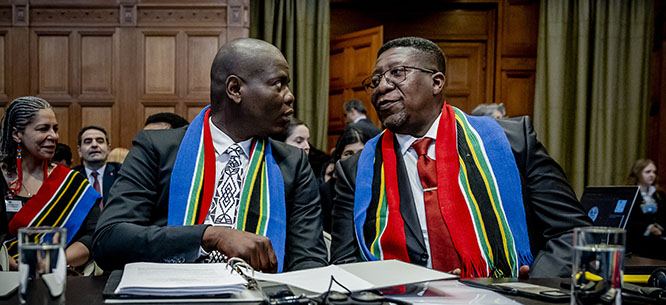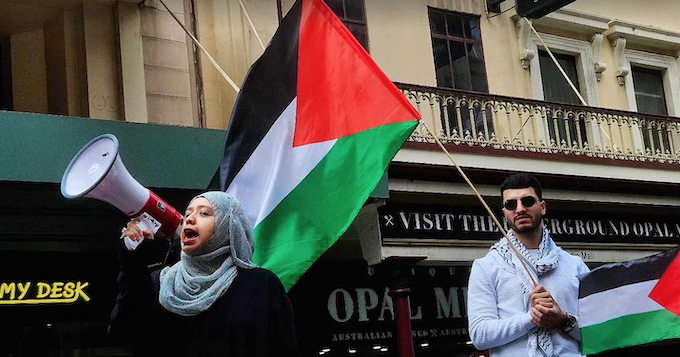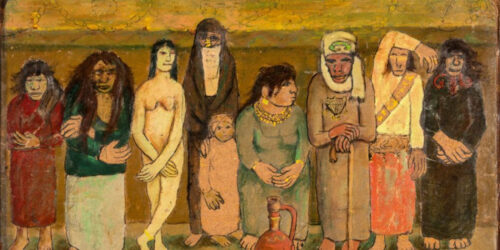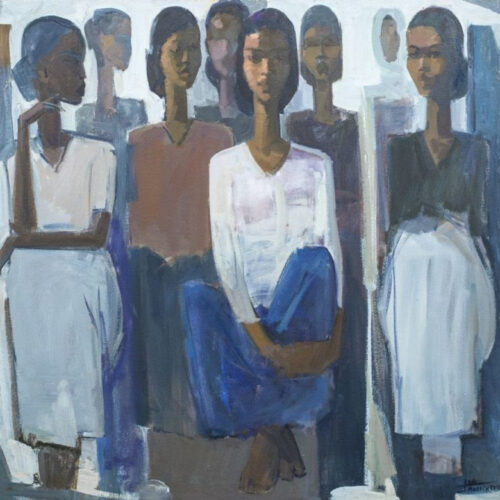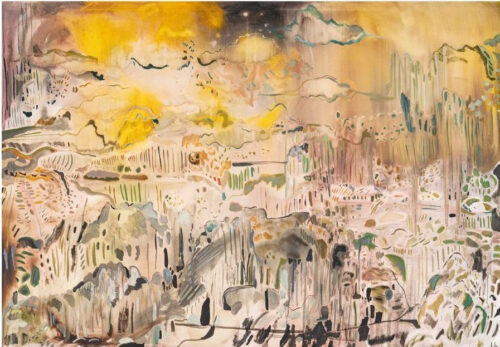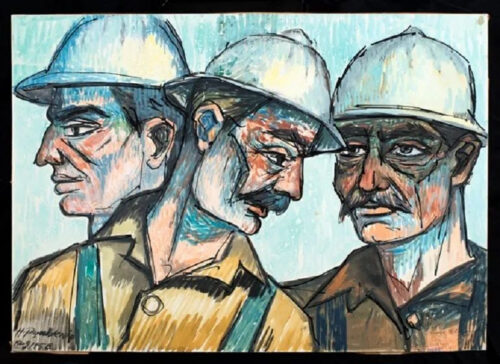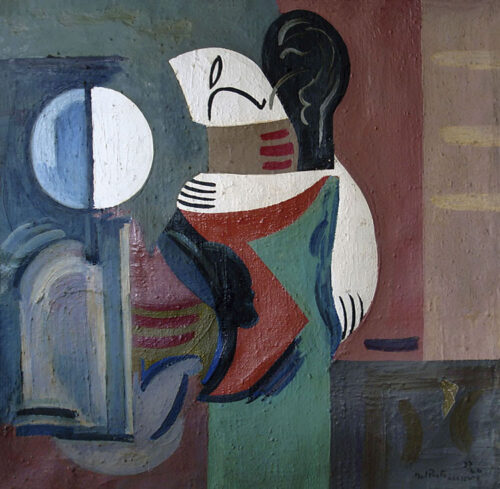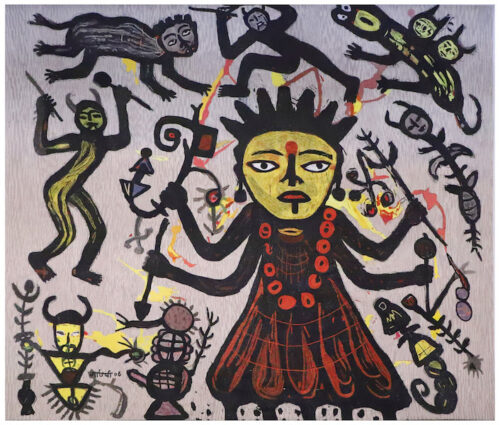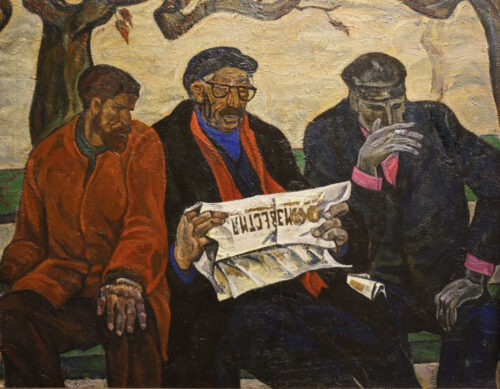
I find Westerners in general, and Europeans in particular, extremely indoctrinated and obsessed with perceptions of their own uniqueness. Many see themselves as chosen people, after going through a one-sided education and after relying on their media outlets, without studying alternative sources.
— André Vltchek, Soviet-born US political writer, 1963-2020.
On 20 March 2006, on the third anniversary of the illegal invasion of Iraq, BBC diplomatic correspondent Bridget Kendall declared on the Six O’Clock News:
‘There’s still bitter disagreement over invading Iraq. Was it justified or a disastrous miscalculation?’
The supposed ‘justification’ claimed by Prime Minister Tony Blair was the ‘serious and current threat’ posed by Iraq’s alleged weapons of mass destruction. The BBC’s false notion of ‘balance’ was to present ‘disastrous miscalculation’ as the counterargument. In fact, as we detailed at the time in media alerts and in our books, the invasion was considered by many legal experts to be a ‘war of aggression’, the ‘supreme international crime’ as judged by the standards of the post-WW2 Nuremberg trials.
But such a view is deemed too extreme for respectable BBC discourse. Even today, the BBC’s Laura Kuenssberg glibly notes:
Labour nerves still jangle over what went so terribly wrong in Iraq, even after all these years.
The implication, endlessly channelled by the BBC, is that a ‘disastrous miscalculation’ occurred, rather than an international war crime leading to the deaths of over one million Iraqis; a crime for which no western leader, or their media cheerleaders, has ever been tried in court. That outcome, in any serious responsible society, would have been more fitting than mere ‘jangling nerves’ among politicians.
But such narrative control is an endemic feature of state-corporate media, wrongly labelled ‘mainstream’. It is a fundamental requirement of political journalists and editors that they magically transform the crimes of ‘our’ governments into ‘miscalculations’, ‘mistakes’ or ‘misguided’ attempts to do good. This transformation is a power-serving alchemy turning the base metal of brutal realpolitik into the gold of benign intention, all for public consumption.
Noam Chomsky succinctly explained the ideological underpinning of ‘mainstream’ news coverage:
In discussion of international relations, the fundamental principle is that “we are good” – “we” being the government, on the totalitarian principle that state and people are one. “We” are benevolent, seeking peace and justice, though there may be errors in practice. “We” are foiled by villains who can’t rise to our exalted level.
— Chomsky, Interventions, Penguin Books, London, 2007, p. 101.
It does not matter how frequently, or how horrifically, this benevolent claim is violated by Western countries, journalists can be relied upon to perform the necessary whitewashing: the Gulf War in 1990-91, Nato’s bombing of Yugoslavia in the 1990s, Iraq sanctions from 1990-2003, the invasion of Afghanistan in 2001 and Iraq in 2003, the destruction of Libya in 2011, the US-sponsored toppling of the Ukrainian government in 2014, US-Nato air strikes against Syria, participation in the Saudi-led bombing of Yemen, and now the attacks on ‘Iran-backed’ Houthi rebels. (Of course, convention decrees that the Houthi are always described as ‘Iran-backed’, whereas Israeli forces are not routinely labelled ‘US-backed’.)
The list goes on and on. You might well ask: at what point do supposedly astute, well-informed, senior editors and political correspondents simply stop regurgitating government propaganda; even start challenging it? How much blood has to be spilled, how many lives lost, how much vital infrastructure – homes, hospitals, power plants – destroyed by ‘our’ weaponry, with ‘our’ diplomatic, political and economic support?
But, of course, serious media challenge of elite power is highly unlikely. ‘Successful’ media professionals are fed through an industrial filter system that rewards steady adherence to state-approved narratives. As Chomsky once so memorably told a discombobulated Andrew Marr:
I’m sure you believe everything you’re saying. But what I’m saying is that if you believed something different, you wouldn’t be sitting where you’re sitting.’
Misleading The Public Is State Policy
In several powerful books, based on careful research of formerly secret UK government documents, historian Mark Curtis, co-founder of Declassified UK, has laid bare the motivations and reality of British foreign policy. Ethical concerns and morality are notable in these internal state records by their absence. Curtis observed:
a basic principle is that humanitarian concerns do not figure at all in the rationale behind British foreign policy. In the thousands of government files I have looked through for this and other books, I have barely seen any reference to human rights at all. Where such concerns are evoked, they are only for public-relations purposes.
— Curtis, Unpeople: Britain’s Secret Human Rights Abuses, Vintage, London, 2004, p. 3.
He added:
in every case I have ever researched on past British foreign policy, the files show that ministers and officials have systematically misled the public. The culture of lying to and misleading the electorate is deeply embedded in British policy-making.
— Ibid., p. 3.
This is especially true when it comes to Western terrorism. But what exactly is terrorism? The definition from a US army manual is:
The calculated use of violence or threat of violence to attain goals that are political, religious, or ideological in nature. This is done through intimidation, coercion, or instilling fear.
— Chomsky, ‘The new war against terror’, talk given at the Massachusetts Institute of Technology on 18 October 2001.
By this definition, the major source of international terrorism is the West, notably the United States, supported by its ‘special relationship’ ally, the UK. Curtis wrote:
The idea that Britain is a supporter of terrorism is an oxymoron in the mainstream political culture, as ridiculous as suggesting that Tony Blair should be indicted for war crimes. Yet state-sponsored terrorism is by far the most serious category of terrorism in the world today, responsible for far more deaths in many more countries than the “private” terrorism of groups like Al Qaida. Many of the worst offenders are key British allies. Indeed, by any rational consideration, Britain is one of the leading supporters of terrorism in the world today. But this simple fact is never mentioned in the mainstream political culture.
— Curtis, Web of Deceit: Britain’s Real Role in the World, Vintage, London, 2003, p. 94.
The US-UK-supported genocidal attacks by Israel on the people of Gaza, now extending to over 100 days, have made it ever more difficult for politicians and managers of public perception to maintain the myth of western benevolence and a ‘global rules-based order’.
The Financial Times reported last October:
Western support for Israel’s assault on Gaza has poisoned efforts to build consensus with significant developing countries on condemning Russia’s war against Ukraine, officials and diplomats have warned.
The FT article continued:
“We have definitely lost the battle in the Global South,” said one senior G7 diplomat. “All the work we have done with the Global South [over Ukraine] has been lost…Forget about rules, forget about world order. They won’t ever listen to us again.”
The senior G7 diplomat added:
What we said about Ukraine has to apply to Gaza. Otherwise we lose all our credibility. The Brazilians, the South Africans, the Indonesians: why should they ever believe what we say about human rights?
Why indeed.
Naledi Pandor, South Africa’s foreign minister, observed recently that:
I think this notion of international rules is very comfortable for some people to use when it suits them but they don’t believe in international rules when it doesn’t suit them. Because they don’t apply international rules or law equally in all circumstances.
She added:
You can’t say because Ukraine has been invaded, suddenly sovereignty is important, but it was never important for Palestine.
To put it bluntly, the notion of the West upholding a rules-based international system is a blood-drenched myth.
Gaza – A War ‘To Save Western Civilisation’
Last week, South Africa presented a detailed 84-page submission to the International Court of Justice (ICJ) – essentially the UN’s global law court – arguing that Israel is committing genocide in Gaza. The case was brought under the 1948 Convention on the Prevention and Punishment of the Crime of Genocide.
The South African legal team showed ample evidence of Israeli genocidal acts in Gaza, as well as the stated intention to commit genocide, indicated in public statements by numerous senior Israeli political and military leaders. On 28 October last year, Israeli Prime Minister Benjamin Netanyahu delivered a speech in which he compared the Palestinians to the Biblical people of Amalek. In the first Book of Samuel, God commanded King Saul to kill every person in Amalek, a rival nation to ancient Israel:
Now go, attack the Amalekites and totally destroy all that belongs to them. Do not spare them; put to death men and women, children and infants, cattle and sheep, camels and donkeys.
We could find no reference to Netanyahu’s genocidal comparison of the Palestinians to the Amalekites on the BBC News website.
Around 24,000 people have been killed in Gaza since 7 October last year, including over 10,300 children and 7,100 women. There may be another 7,000 buried under the rubble. In other words, over 70 per cent of those killed are women and children. Around four per cent of Gaza’s population has either been killed, wounded or is missing under rubble.
According to the United Nations Relief and Works Agency, by the end of 2023, 1.9 million people – nearly 85 per cent of the total population of Gaza – had been internally displaced under Israel’s attacks. These include many families who have been displaced multiple times, forcibly and repeatedly moved to try to flee Israel’s bombardment. But, as the UN has warned, there is no safe place in Gaza. Oxfam reported that Israel’s military is killing Palestinians at an average rate of 250 people a day, exceeding the daily death toll of any other major 21st century conflict. Many more lives are at risk from hunger, disease and cold, warned Oxfam.
As of 30 December, about 65,000 residential units in Gaza had been destroyed or made uninhabitable and over 290,000 housing units had been damaged, meaning that over half a million people will have no home to return to. Thirty out of Gaza’s thirty-six hospitals are not functioning, and the remaining six are only partially functioning.
Jonathan Cook noted that the West is now standing in the dock alongside Israel at the ICJ:
Israel expects support from western capitals because they have nearly as much to fear from a verdict against Israel as Israel itself. They have staunchly backed the killing spree, with the US and UK, in particular, sending weapons that are being used against the people of Gaza, making both potentially complicit.
Cook pointed out that it is significant that South Africa has brought the case of genocide against Israel. Both countries ‘bear the trauma of Europe’s long history of racial supremacism, but each has drawn precisely opposite lessons.’ As Nelson Mandela, South Africa’s first post-apartheid president, said:
We know too well that our freedom is incomplete without the freedom of the Palestinians.
Israel’s most brutal assault in Gaza’s history is a continuation of its long war of oppression against the Palestinians. Israeli president Isaac Herzog described the genocidal attacks on Gaza as a war ‘to save Western civilization, to save the values of Western civilisation.’ As the political writer Caitlin Johnstone pointed out, Herzog was right; but not in the way he intended. She explained:
The demolition of Gaza is indeed being perpetrated in defense of western values, and is itself a perfect embodiment of western values. Not the western values they teach you about in school, but the hidden ones they don’t want you to look at.
Johnstone continued:
For centuries western civilization has depended heavily on war, genocide, theft, colonialism and imperialism, which it has justified using narratives premised on religion, racism and ethnic supremacy — all of which we are seeing play out in the incineration of Gaza today.
She added:
What we are seeing in Gaza is a much better representation of what western civilization is really about than all the gibberish about freedom and democracy we learned about in school.
A BBC News report on the ICJ proceedings was titled, with fake balance, ‘South Africa’s genocide case against Israel: Both sides play heavy on emotion in ICJ hearing’. This was a distortion of the truth: the South African case was presented with dignity, clarity and forensic detail. As the BBC conceded deep in its report, it was Israel who made a strong appeal to emotions, displaying the images of 132 missing Israelis – most of them still being held hostage in Gaza. But, as Kenneth Roth, former executive director of Human Rights Watch, noted of Israel’s legal case:
Its repeated invocation of Hamas’s horrible 7 October attack and alleged genocidal aspirations are irrelevant because atrocities by one side do not justify genocide by another. Its argument of self-defence is beside the point because a legitimate defence does not allow genocide.
BBC News marked one hundred days of the current phase of the Israel-Palestine crisis with a classic example of propaganda bias. The BBC website headlined a major 3,000-word piece on the October 7 attacks. Underneath, there was a tiny link to a one-minute video of footage from Gaza that clearly underplayed the level of destruction. This is called BBC ‘impartiality’.
True to form, Washington is doing its utmost to protect Israel. During a press briefing, US national security spokesman John Kirby told reporters:
South Africa’s lawsuit against Israel is “meritless, counterproductive and completely without any basis in fact whatsoever”.
Interviewed by Andrew Napolitano, a former judge and law professor, Jeffrey Sachs, Director of the Center for Sustainable Development at Columbia University responded to Kirby’s dismissive remark:
I just wish there were grown-ups in power. Grown-ups who are responsible, who are honest, who are decent, who would read an 84-page detailed complaint and give a serious answer, rather than a one-sentence smack-off like that.
He added:
I wish, at the same time, that the White House press corps would follow up more seriously. Actually, if I remember correctly, that question started with a few words, “Just a quick one”. And then the question was asked and Kirby responded in this utterly disgusting way when the most important issue on the planet is in front of him, and couldn’t do more than one dismissive, phony and false statement. But then there’s no follow-up [by the journalists at the press briefing]. Then they move on to the next topic. And the next topic.
Sachs continued:
Why don’t the journalists do their job, rather than feeding us the propaganda from the White House? They should be questioning the propaganda. That’s why I was grateful for today’s [ICJ] court proceedings because there were hours to put forward the evidence. There is a detailed legal complaint. There are dozens of countries that have supported this. But the US government is all spin, all propaganda, and all attempt at narrative control.
This is, of course, standard behaviour for the world’s major perpetrator of terrorism.
The Language Of Genocide
Media academics have analysed Israel-Palestine coverage and found that Palestinian perspectives are given ‘far less time and legitimacy’ than Israeli views in the British media. Last month, Greg Philo and Mike Berry of the highly-respected Glasgow Media Group examined four weeks (7 October – 4 November, 2023) of BBC One daytime coverage of Gaza to identify which terms were used by journalists themselves – i.e. not in direct or reported statements – to describe Israeli and Palestinian deaths.
They found that ‘murder’, ‘murderous’, ‘mass murder’, ‘brutal murder’ and ‘merciless murder’ were used a total of 52 times by journalists to refer to Israelis’ deaths but never in relation to Palestinian deaths. Philo and Berry noted that:
The same pattern could be seen in relation to “massacre”, “brutal massacre” and “horrific massacre” (35 times for Israeli deaths, not once for Palestinian deaths); “atrocity”, “horrific atrocity” and “appalling atrocity” (22 times for Israeli deaths, once for Palestinian deaths); and “slaughter” (five times for Israeli deaths, not once for Palestinian deaths).
But more importantly:
The Palestinian perspective is effectively absent from the coverage, in how they understand the reasons for the conflict and the nature of the occupation under which they are living.
Tim Llewellyn, a former BBC Middle East correspondent, once observed that what is routinely missing from BBC coverage is that Israel’s occupation of Palestinian land:
demeans and degrades people: not just the killing and the destruction, but the humiliation, the attempt to crush the human spirit and remove the identity; not just the bullet in the brain and the tank through the door, but the faeces Israel’s soldiers rub on the plundered ministry walls, the trashed kindergarten; the barriers to a people’s work, prayers and hopes.
Emre Azizlerli, a former senior BBC producer, said recently via X (formerly Twitter):
I worked there for over 20 years. Internal boards determine who gets promoted by a panel of the applicant’s superiors. The political likes and dislikes of those at the very top easily trickle down in this chain mechanism all the way down to how producers behave, since everyone wants to please their boss to move ahead.
No wonder that a Morning Star tribute to the late John Pilger, who reported on Palestine over many years, noted that his death ‘leaves a void’, adding:
There are few investigative journalists of his courage or integrity. And designedly so. From the censorship of “hostile” voices across the internet to the outrageous incarceration of Julian Assange, every effort is being made to stamp out independent journalism.
Throughout his career, Pilger drew attention to the role of the media as ‘an appendage of established power’. Addressing a conference last March, organised by the Morning Star, he called for:
urgent debate and activism around the issue of the media… the media was rarely a friend of working people, but there were spaces for independent journalists in the mainstream.
He continued:
My own career is testament to that. Until a few years ago I worked in mainstream newspapers — in later years the Guardian mainly — but the Guardian like the others is now closed to independent thinking and honest journalism… we need to understand that the media is now fully integrated into an extremist state, and that working people must look elsewhere — to the Morning Star, yes, and to oases on the internet where good journalism flourishes.
Pilger often cast a sceptical eye on those whom we are supposed to regard as the best journalists working in the major news media. They are nevertheless performing a propaganda role by demarcating the permissible limits of reporting. For example:
BBC reporter, Jeremy Bowen, who talks about a war between Israel and Hamas. Bowen knows that’s wrong. It’s an attack on an occupied people by the occupier, Israel, backed by great powers.
State-corporate journalism – BBC News is a prime example – is far removed from the mythical notion of reporting the truth to the public. As the playwright John McGrath once wrote:
The gentlemen at the head of the powerful opinion-forming corporations do not wish to have their articulate mediation of reality disturbed by a group of people going around with a different story, seeing events from a different perspective, even selecting different information. Still less do they wish to have the population at large emerging from their mental retreat – the inner exile of the powerless and alienated – and demanding a share of power, of control, of freedom.’
— McGrath, A Good Night Out: Popular Theatre: Audience, Class and Form, Nick Hern Books, 1981, pp. 89-90.
We should all reject the output of ‘the powerful opinion-forming corporations’ and look elsewhere, to those internet oases of real journalism, in order to understand the world and to radically change it for the better.
The post
Gaza: A Brutal Demonstration Of “Western Values” first appeared on
Dissident Voice.
This post was originally published on Dissident Voice.
